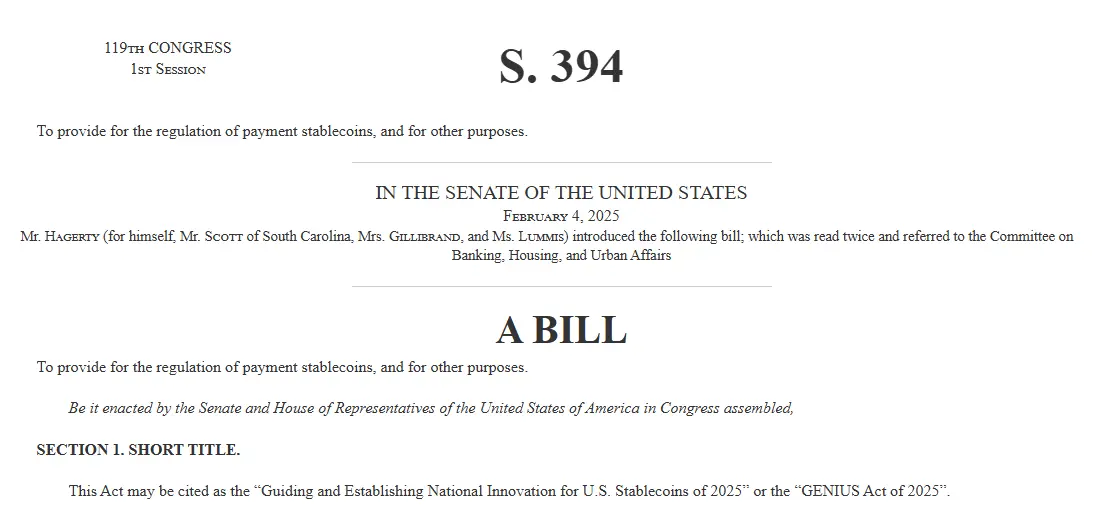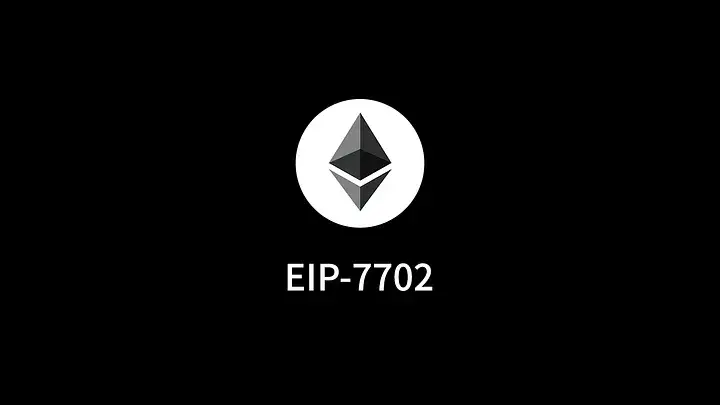Never underestimate the significance of the Genius Act for U.S. stablecoins
Author: 0xTodd
If the GENIUS Act is passed, it will be of great significance, and I think it will even be enough to enter the top five in crypto history.

Although abbreviated as GENIUS Act, which literally translates to Genius Act, it is actually Guiding and Establishing National Innovation for U.S. Stablecoins, which actually translates to "National Innovation for Guiding and Building U.S. Dollar Stablecoins".
The proposal is very long, and there are a few points to summarise for you:
1. Mandatory 1:1 Full Assets: This includes cash, bank demand deposits, short-term U.S. Treasury bonds. At the same time, misappropriation and re-pledge are strictly prohibited.
2. High-frequency information disclosure: Publish a reserve report at least once a month and introduce external audits.
3. Licensing: Once the issuer's stablecoin has a circulating market capitalisation of >$10 billion, it must be transferred to the federal regulatory system within a specified period of time, with bank-grade regulation.
4. Introduce custody: The custodian of stablecoins and their reserve assets must be regulated and qualified financial institutions.
5. Clearly defined as a medium of payment: The Act clearly defines stablecoins as a new medium of payment, primarily subject to the banking regulatory system, rather than the securities or commodity regulatory system.
6. Zhao'an's existing stablecoins: A grace period of up to 18 months after the bill comes into effect, which is intended to urge issuers of existing stablecoins (such as USDT, USDC, etc.) to obtain licenses or incorporate compliance as soon as possible.
--- dividing line---
Now that I'm done with the main article, let's talk about the significance of this matter with excitement.
Over the past few years, people have asked, what applications have you made in the crypto industry for 16 years?
In the future, you can confidently talk to others about stablecoins.
First, clearing up concerns is a prerequisite
Some people have objected to the idea that stablecoins used to be opaque black boxes. Every few months, FUD is required, either Tether's assets are frozen, or there is a big hole in Circle.
In fact, if you think about it, Tether can easily earn billions of dollars a year just by relying on the interest on those underlying Treasury bonds. Circle also made a profit of $1.7 billion last year.
This is standing and making money, in terms of motives, they don't have any motive to do evil, but they are also the most eager to be compliant.
Now, this opaque black box will become a transparent white box.
In the past, it was nothing more than criticising Tether's money that might have been frozen by the United States, but now it is directly put into the U.S. compliant custodian, and high-frequency information disclosure can be directly assured.
What an advantage it is to not have to worry about running away - I think all Crypto people in particular understand it.
Second, it's important to master standards
Stablecoins, which were once almost stolen by CBDCs, were once the fruits of victory. No matter which country, if there is really a central bank digital currency, it is most likely not built on the blockchain, but at most on some internal alliance chain of the central bank, which is honestly meaningless.
When CBDCs were at their hottest, stablecoins were at their most dangerous.
If CBDC had done this, then the current stablecoin would have been infinitely suppressed to a dark corner, and the blockchain could only play a minimal role.
The remaining half-dead stablecoins even have to learn the standards of central bank digital currencies, and the right to speak in the standards is completely sidelined.
And now, stablecoins have won (and will be).
Instead, everyone should learn the standard of [blockchain + Token].
Nowadays, many blockchains, in fact, have no meaningful applications on them, except for stablecoin transfers. For example, Aptos, the only scenario I use Aptos is from Binance to OKX transfer.
And now, what does it mean that stablecoins will be legislated?
That's right, blockchain, will become the only standard.
In the future, every stablecoin user will first learn to use a wallet.
As an aside, now I think Ethereum's push for EIP-7702 is really a bit forward-looking. While other chains are swarming to meme, thank you to Ethereum for still insisting on account abstraction.

EIP-7702 is an account abstraction that supports e.g.
Register a wallet with a social media account
Pay for GAS in your local currency
Wait a minute
This solves the last mile by allowing new users to use stablecoins in large quantities in the future.
Third, the deposit has entered a new era
And once stablecoins are supported by legislation, deposits and withdrawals will become simpler.
Let's imagine a scenario where there was no way to do it due to the grey nature of stablecoins before, but after the bill is passed, many traditional brokerages can support stablecoins themselves. The money of U.S. stock investors turns into stablecoins in minutes, and then it is directly stuffed into Coinbase in a second, believe it or not.

Let's imagine another scenario, if the genius bill enters the House of Representatives and goes through the process smoothly, next, you will see:
Because this trading is too lucrative, the existing stablecoin leaders and the new traditional giants have frantically started to promote their stablecoin products.
And an outsider, because of these promotions began to use stablecoins. Then one day I found that since the wallet accounts have been created, is it very difficult to understand the bitcoins inside?
Stablecoins are a giant Trojan horse, and the moment you start using them, you're already half-footed in the crypto world before you know it.
Fourth, finally
As a large reservoir for digesting U.S. bonds, although stablecoins cannot directly convert bonds, they at least provide a bullet for the secondary market of U.S. bonds. These functions are quite important, and slowly, stablecoins become part of the body of the U.S. Treasury market. Therefore, once the United States has passed the legislation, it is impossible to go back and cancel it after tasting this sweetness.
Moreover, we are also confident that stablecoins are indeed one of the great innovations in our industry, and it will be difficult for people who have used stablecoins to return to the traditional cash-banking system.
The bill can't go back, and neither can the users. In the future, concerns will be cleared, standards will be mastered, and the era of big deposits seems to be imminent.
